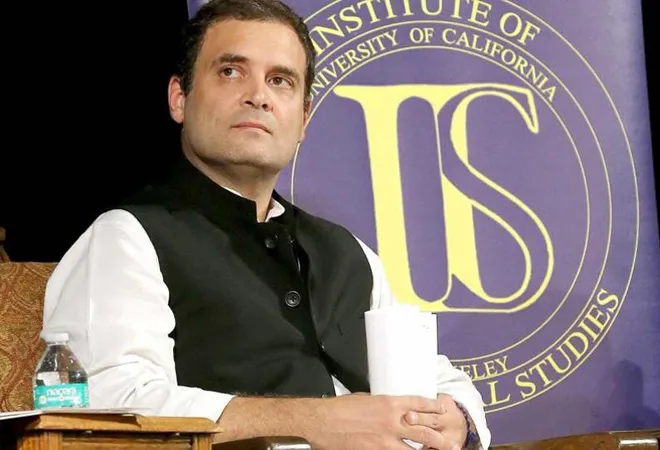-
CENTRES
Progammes & Centres
Location

Congress vice president Rahul Gandhi’s speech at the University of California, Berkley has received considerable attention from the media. The attention aside, Gandhi’s ongoing visit to the US is part of a new and larger Congress strategy that envisions the importance of Indian Americans to India. Perhaps, the Congress is drawing a leaf from the Narendra Modi led government's foreign policy that focuses heavily on the Indian diaspora, viewing them as agents of change, encouraging them to be a part of India’s growth story. Ram Madhav, the general secretary of the BJP, at the launch of the Indian Diaspora Investment Initiative made this policy clear when he said, "they (Indian diaspora) can be India's voice even while being loyal citizens in those countries. That is the long-term goal behind the diaspora diplomacy. It is like the way the Jewish community looks out for Israel's interests in the United States".
Who really belongs to a diaspora? The term 'diaspora' has evolved over time. It signified the migration and colonisation of the Greeks and later referred to Jews in exile who were expelled from many countries, thereby taking on both positive and negative connotations. Today, however, the term loosely describes people of one nationality or common origin living outside their home country.
As discussed above, a diaspora can play a crucial role in pushing to achieve their home country's interests from abroad. The easiest way for the diaspora to contribute to their home country's development is by way of remittances.
India was the world's largest recipient of remittances in 2016 having received $62 billion. However, the importance of Diasporas does not end with remittances alone but extends to knowledge transfer, the sharing of resources, acting as unofficial Indian ambassadors and pushing for India's interests abroad.
The 2015 International Migration Report estimated that 16 million Indians lived abroad, making it the second largest diaspora in the world. Has this large community lobbied for India's interests? Did the diaspora shape Indian foreign policy in any way? Perhaps the most successful role the diaspora played was in ensuring the passage of the India-US Nuclear Deal in 2008. However, as for the diaspora's role in shaping and furthering India's foreign policy goals, it is unclear to the extent of their engagement. Nevertheless, as more people of Indian origin take up larger roles in politics, business and entertainment abroad, they will be more likely to not only invest in India but also help further India's interests.
Two good examples are Antonio Costa, the Portuguese Prime Minister, and Leo Varadkar, Ireland's Prime Minister. Both belong to the Indian diaspora, and come from two economically strong countries that can trade with India. Portugal has already signed MOUs with India in science and technology, double taxation avoidance, space, trade and investment. Further, the two countries have agreed to create a joint science fund of four million Euros where they will collaborate in science research projects. As for Ireland and other countries like the Netherlands with a large Indian diaspora, they are more likely to support India in her bid to join the United Nations Security Council (UNSC) and the Nuclear Suppliers Group (NSG). This will be even more likely with enough pressure from the diaspora.
India can also benefit from the diaspora in North America in achieving her space, defence and security goals. Groups like the United States India Political Action Committee (USINPAC), Friends of India, Canada India Foundation (CIF) and Canada India Business Council (CIBC), are already actively pushing for India's interests. Take for example the recent passing of the American defence budget in June 2017, totaling $US621 billion, where Indian-American Congressman Ami Bera, stressed in his amendment for "advanced defence cooperation between our two nations". The amendment included a 180-day deadline for the US to develop its defence strategy with India. In Canada, the CIF and the CIBC are proponents of stronger ties between the two states, even supporting a free trade deal. In April this year Harjit Sajjan, Canada's defence minister, visited India to strengthen defence ties between the two nations.
The government can also benefit from the Indian diaspora in the Middle East. Modi certainly envisions India playing a larger role here especially in terms of security and defence.
India needs delicate balancing between its relationships with Saudi Arabia, Israel and Qatar as it has interests engaged with all three countries. Currently, India enjoys a favourable relationship with the three countries, perhaps to an extent due to the presence of the diaspora. Indians in the Middle East are known to be honest and hard workers. This "soft power" asset may have helped in convincing Saudi Arabia that India is and will remain a long-term trading partner despite Modi pursuing stronger ties with Israel. Similarly, External Affairs Minister Sushma Swaraj was very clear that India's interest in the Qatar diplomatic crisis is limited to the diaspora, and the crisis is an intra-regional issue. This stance allows India to pursue separate yet significant ties with individual countries in the region.
Smaller but equally important ways in which the Indian community abroad helps further India's foreign policy goals, is by helping in the return of stolen artefacts. The Indian Pride Project for example successfully lobbied to bring back the famous Nataraja from Australia, and sandstone Yakshi from the United States.
However, the support of the diaspora is neither automatic nor continuous. They have been critical of bureaucratic procedures in India among other issues. The Canadian politician, Jagmeet Singh, for example has been very critical of the treatment of minority groups in India. Yet, the diaspora can help further India's interests and have risen to the occasion when India needed them. Moreover, the expectations of the diaspora, in return for their help from the Indian government is varied. While those from countries like Australia, the US and Canada demand dual citizenship and easier routes to invest in India, immigrants in the Gulf states require more help in day-to-day survival, and people of Indian origin in countries like Fiji, Kenya and Trinidad and Tobago look to India for cultural ties. The Modi government will have to continue to work with these diaspora groups separately to fully benefit from the complementary relationship shared between the diaspora and its home country, focusing on his flagship programs like ‘Make in India’, while also playing a larger role in the Indian space programme and in the expansion of trade, defence and security ties.
The writer is a Research Intern at Observer Research Foundation, Delhi
The views expressed above belong to the author(s). ORF research and analyses now available on Telegram! Click here to access our curated content — blogs, longforms and interviews.

Shreya Challagalla is a graduate of International Studies and Journalism from FLAME University Pune and is a Research Fellow at India Foundation. She worked with ...
Read More +